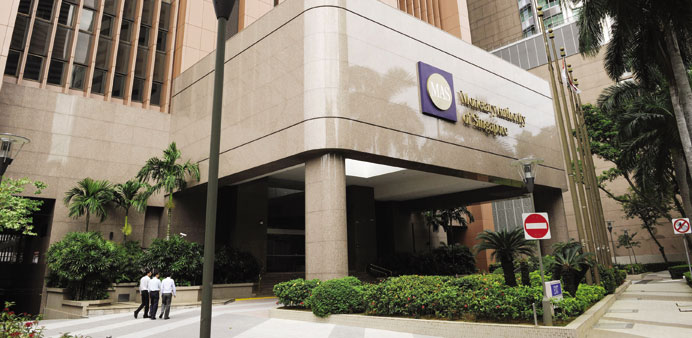The logo of the Monetary Authority of Singapore (MAS) is displayed at its headquarters. The MAS is consulting the market on a series of changes including minimum trading prices.
Reuters/Singapore
Singapore has proposed a major shake-up of its stock market rules following a penny stock scandal which hit trading volumes on Southeast Asia’s largest bourse that has recently struggled to attract big share listings like its rival in Hong Kong.
The Monetary Authority of Singapore (MAS) and Singapore Exchange (SGX) said yesterday they are consulting the market on a series of changes including minimum trading prices, new collateral rules, short-selling reporting, and the establishment of independent committees to vet listing applicants and impose regulatory sanctions.
The Singapore Exchange is the sole operator of the city state’s stock market but has found it difficult to increase trading volumes in the past few years and trails Hong Kong in league tables for big ticket new issues. In January, its average daily value of securities traded was S$1.07bn, down 41% from the same level a year ago.
The thin trading volumes have encouraged activity in “ultra penny stocks”, which trade for as little at S$0.001 and have become some of the most actively traded shares.
Problems surfaced in the market in October when shares in three companies - Blumont Group, LionGold Corp and Asiasons – crashed and wiped out about S$8bn ($6.31bn) in value in just two days after huge run-ups in their share prices.
Lee Chuan Teck, assistant managing director for capital markets at MAS said: “This consultation allows us to have a conversation with all stakeholders on how to make the market strong and more mature.”
The proposals include details on a minimum share trading price, with regulators looking at a minimum range of around S$0.10 and S$0.20.
If that were introduced around 130 to 230 companies listed on SGX would struggle to meet it, but regulators said most would be able to comply through “share consolidation” that could take place during a transition period of at least a year.
Companies that still did not meet the requirement would have to be delisted, although shareholders would still be able to exit their positions at an alternative trading facility.
“Low-price securities are generally associated with high volatility, which in turn makes them more susceptible to speculation and potential market manipulation,” MAS and SGX said. “Introducing a minimum trading price as a continuing listing requirement will help to address these risks.”
The Securities Investors Association of Singapore said the proposals would create a more orderly and transparent market. The penny stock scandal has also highlighted the practice of “contra trading”, a system only used in Singapore and Malaysia where investors can trade shares without posting any collateral, blamed for creating excessive speculation. The regulators are proposing bringing in collateral requirements of at least 5% of a customers’ open position and reducing the settlement period to two days.
The SIAS said in a statement this would help to discourage a “gambling mentality and encourage an investing mindset.”
Independent committees to vet listing applicants and to hear formal charges brought by SGX against issuers that have breached listing rules are also being considered.
These aim to deal with any conflicts of interest. SGX is the front-line regulator of the city-state’s stock market as well as its commercial operator.
“I think in the short term this will probably have some negative effect on trading volumes as there are some retail traders there just to take a speculative position, but MAS and SGX’s position is they want less of that and a sounder market structure,” Kenneth Ng, of brokerage CIMB Securities, said.

